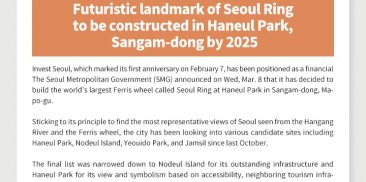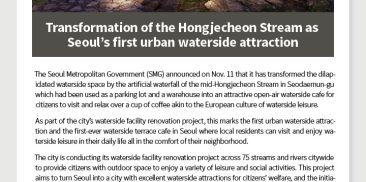ソウルの文化遺産
-
Plan to Enrich Gimpo Plain: Drainage Pump Station of the Yangcheon Irrigation Association
-
ソウルの文化遺産 登録日投稿者SMG ヒット2,766
In 1923, the Japanese Governor-general of Korea established the Yangcheon Irrigation Association in the fertile Gimpo Plain as part of the plan to build more irrigation facilities across the country to secure Joseon’s land and increase the agricultural yield in line with the Rice Products Proliferation Plan. The Drainage Pump Station of the Yangcheon Irrigation Association was built to move water to the plain and is the only agricultural facility still existing that was established by both Koreans and Japanese, who owned a land area of 595-jeongbo (1 jeongbo = 0.99174 hectares) in Magok, Gayang, and Yeonchang. The Drainage Pump Station is made up of an external wall, consisting of a water gate and a concrete foundation, and a wooden shed, where a double roof was built at the open space on the second floor. The exterior of this structure was built with a wooden feather board wall that is black because of the wood preservation treatment, and the roof was made with lozenge-shaped cement slate roofing. The ceiling was based on the large-size king post truss method in an effort to reflect the features of modern wooden buildings of the time. The maximum interior height between floors is 12.6 meters, indicating that the building was constructed in a substantially large size for the time. It is presumed that the pumping station was used until the early 1980s, before the development of a new town in Mok-dong. In 1991, a comprehensive renovation was carried out, following the discontinuance of its original use, so that it could be used as office space.







